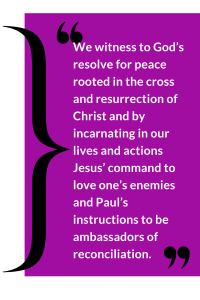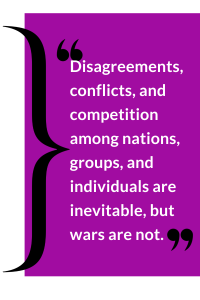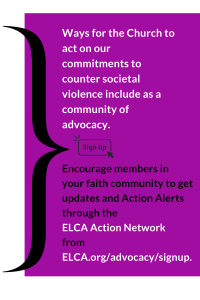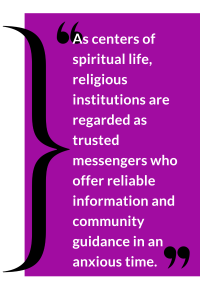by the Rev. Amy E. Reumann, Senior Director, ELCA Witness in Society
High anxiety around the possibility of political violence has been with us before, during, and likely following the 2024 National Election. The images of the Jan. 6, 2021, assault on the Capitol are fresh in our minds, making calls by public figures for violence against political opponents or disruption of election processes even more worrisome. Election activities that used to go largely unnoticed, such as election certification or routine actions by poll workers, could now be targeted as high-risk moments. Polling reveals that two-thirds of Americans fear violence following the election. Many municipalities and communities have prepared for disruptions pre- and post-election.
THE CALLING OF THE CHURCH
 The church has a “calling to proclaim the Gospel of God’s final peace and to work for earthly peace” (ELCA social statement For Peace in God’s World, p. 1). We witness to God’s resolve for peace rooted in the cross and resurrection of Christ and by incarnating in our lives and actions Jesus’ command to love one’s enemies and Paul’s instructions to be ambassadors of reconciliation. The Church breathes life into this calling when we share responsibility for the wellbeing of our neighbors and nation. Informed by Christ’s gift of peace, ELCA ministries and faith leaders have a unique opportunity to promote reconciliation, model peace and respond to violence. Much of this can and will take place at the local level. These resources can equip us for faithful reflection and action.
The church has a “calling to proclaim the Gospel of God’s final peace and to work for earthly peace” (ELCA social statement For Peace in God’s World, p. 1). We witness to God’s resolve for peace rooted in the cross and resurrection of Christ and by incarnating in our lives and actions Jesus’ command to love one’s enemies and Paul’s instructions to be ambassadors of reconciliation. The Church breathes life into this calling when we share responsibility for the wellbeing of our neighbors and nation. Informed by Christ’s gift of peace, ELCA ministries and faith leaders have a unique opportunity to promote reconciliation, model peace and respond to violence. Much of this can and will take place at the local level. These resources can equip us for faithful reflection and action.
REFLECTION AND GUIDANCE IN ELCA SOCIAL TEACHING
The ELCA social statement on Peace provides guidance for ministry and advocacy in global conflicts and everyday struggles. The church contributes to earthly peace by equipping the faithful to act for peace within the Christian community and the broader society. It presents four distinct ways for the church, in the power of the Holy Spirit, to be “a presence for peace that disturbs, reconciles, serves, and deliberates” (p. 5).
- The Church is a disturbing presence when it refuses to be silent and speaks the truth, names false idols and calls for repentance.
- The Church is a reconciling presence by countering religious movements – including ones claiming to be Christian –that preach, and practice hate and violence, by challenging stereotypes of the “the enemy” and by encouraging imaginative solutions to violence.
- As a serving presence the Church holds power accountable, advocates justice, provides sanctuary and meets human need.
- The Church’s deliberating presence creates opportunities for moral deliberation that promote freedom and respect.
 The statement urges churches to nurture a culture of peace through actions to:
The statement urges churches to nurture a culture of peace through actions to:
- Foster a dynamic vision of difference in unity. The hope for earthly peace challenges people to strengthen their local communities in ways that promote respect and appreciation for people in other communities, for all share a common humanity.
- Promote respect for human rights based on the image of God in every person, as reflected in the Preamble to the Universal Declaration of Human Rights [UN, 1948]: “Recognition of the inherent dignity and of the equal and inalienable rights of all members of the human family is the foundation of freedom, justice and peace in the world.”
- Strengthen the will and ability to resolve conflicts peacefully. Disagreements, conflicts, and competition among nations, groups, and individuals are inevitable, but wars are not (ELCA social statement on Peace, pp. 13-15).
Additional social teaching on violence and non-violence offers guidance. The social message on “Community Violence” urges ELCA ministries to join with faith partners to “offer vital spiritual and moral resources for replacing fear and violence with hope and reconciliation in our homes, communities, and nation” (p. 6). It lays out three ways for the Church to act on our commitments to counter societal violence:
- As a Community of Worship – One place to guide our worship is the ELCA “Worship Resources for a National Election.”
- As a Community of Education and Service – The ELCA social statement on Peace is resourced with a Study Guide which can be a useful tool.
- As a Community of Advocacy – Encourage your faith community to get updates and Action Alerts when they are available through the ELCA Action Network from ELCA.org/advocacy/signup.
WHAT DOES THIS LOOK LIKE IN ACTION?
 Affirm the vocation of civil servants and leaders through prayer and education. Lutherans recognize public service as a worthy calling and a means by which all individuals may serve the common good. Studies demonstrate that abuse leveled at public officials across the United States is negatively affecting how they do their jobs, making them less likely to engage with constituents, hold public events, advocate for policies that could lead to blowback, or run for re-election. Beyond the well-publicized attacks on high profile leaders in the news are reports from officials in local and state government who face harassment, intimidation or physical attacks.
Affirm the vocation of civil servants and leaders through prayer and education. Lutherans recognize public service as a worthy calling and a means by which all individuals may serve the common good. Studies demonstrate that abuse leveled at public officials across the United States is negatively affecting how they do their jobs, making them less likely to engage with constituents, hold public events, advocate for policies that could lead to blowback, or run for re-election. Beyond the well-publicized attacks on high profile leaders in the news are reports from officials in local and state government who face harassment, intimidation or physical attacks.
Educate and equip members for nonviolent action and promote healing and reconciliation. ELCA social teaching recognizes that “citizens and residents also have an obligation to seek reform through the procedures of democratic self-rule, which may include nonviolent protest,” (ELCA social message “Government and Civic Engagement in the United States: Discipleship in a Democracy,” p. 12) particularly “in situations where it holds promise of being an appropriate and effective way to bring about greater justice” (ELCA social statement on Peace, p. 20). Local ministries are engaging through learning about violence interruption through active bystander and conflict de-escalation training and encouragement of civil discourse.
As centers of spiritual life, religious institutions are regarded as trusted messengers who offer reliable information and community guidance in an anxious time. Be informed about groups in your area who promote who promote violence, white supremacy and Christian Nationalism. The Episcopal Church Series on Deradicalization offers resources from two organizations known for doing this work on the largest scale – Life After Hate and the now retired Free Radicals Project. Much of the work done is through individuals who have disengaged from radical groups or ideologies and use their experience to work directly with radicalized individuals. The Southern Policy Leadership Center tracks hate and antigovernment groups. The Rev. Elizabeth Eaton, ELCA presiding bishop, has named Christian Nationalism as “a persistent threat to both our religious communities and our democracy.”
ADDING OUR WITNESS
 In October 2024, ELCA bishops jointly issued a statement emphasizing the need to be speakers of truth. It reads, “Emboldened by the Holy Spirit, may we resist deception and lift up the truth that all members of humanity are created in the image of God.” The Dignity Index is an interesting tool to draw our attention away from the biases of partisan politics and toward, what they call, the power we each have to heal our country and each other. It invites reflection on elements of speech, not the speaker, on a scale of communicating contempt to dignity. Our ELCA AMMPARO colleagues have refreshed a resource called “Words Create Worlds,” an exploration of the power of language in shaping perceptions on migration.
In October 2024, ELCA bishops jointly issued a statement emphasizing the need to be speakers of truth. It reads, “Emboldened by the Holy Spirit, may we resist deception and lift up the truth that all members of humanity are created in the image of God.” The Dignity Index is an interesting tool to draw our attention away from the biases of partisan politics and toward, what they call, the power we each have to heal our country and each other. It invites reflection on elements of speech, not the speaker, on a scale of communicating contempt to dignity. Our ELCA AMMPARO colleagues have refreshed a resource called “Words Create Worlds,” an exploration of the power of language in shaping perceptions on migration.
In her statement addressing political violence in July 2024, Bishop Eaton wrote: “Our inevitable future belongs to God. In this certainty and bound together in Christian hope, consider how you can join me in ongoing prayer and actions for our nation, a peaceful election season, the safety of candidates for office, and a bold and life-giving witness of our church in the time ahead.”
If you find this blog post of interest, consider using the ELCA Advocacy Blog signup on this page to have future posts delivered directly to your inbox.

